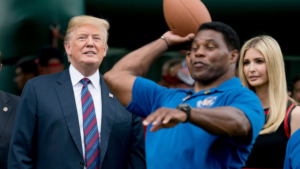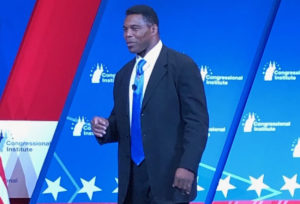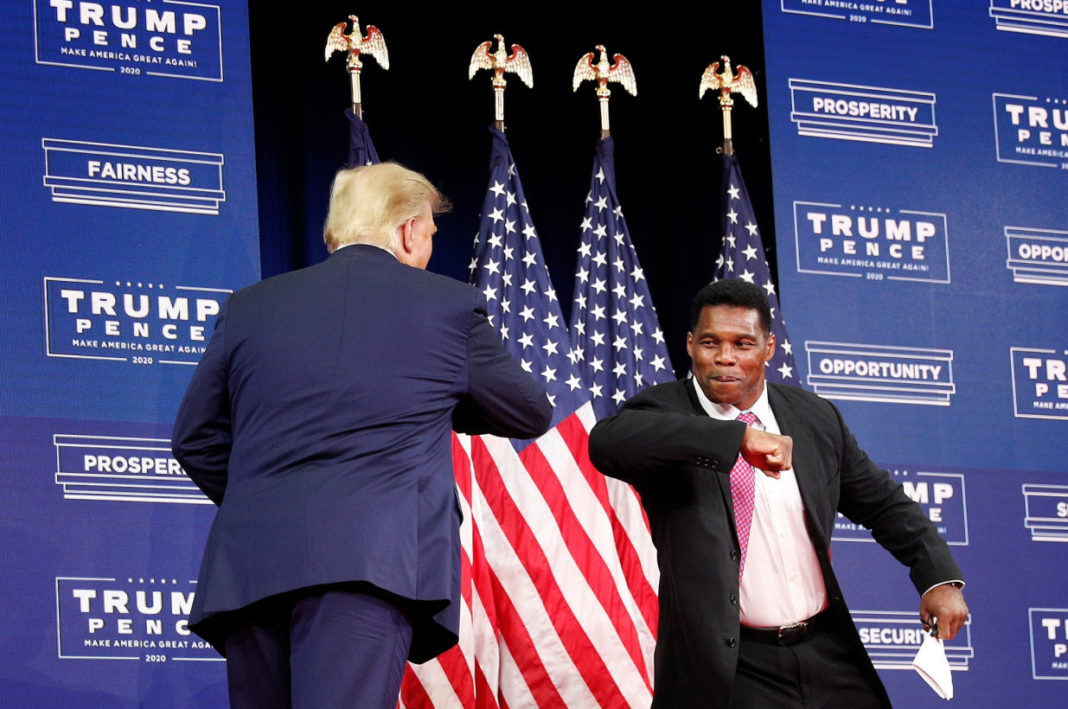The recently ousted former senator who wants her job back. A football hero considering his first run for office. Little-known politicians eyeing promotions. And a former president overshadowing them all in a state he lost last November.
Republicans’ U.S. Senate nomination in a premier battleground like Georgia is a plum political prize, but a year before GOP voters choose a nominee for the 2022 midterms, they have no clear options. That leaves some power players worried about the party’s chances to defeat freshman Democratic Sen. Raphael Warnock as they try to reclaim a Senate majority.
The glaring unknown as potential contenders consider their plans: whether political neophyte Herschel Walker will enter the race with the endorsement of his close friend, Donald Trump.
 Walker was a beloved Heisman Trophy winner for the University of Georgia and retired professional football star who played in the short-lived U.S. Football League when Trump was a team owner in the 1980s. Now, Trump is the former president who has divided Georgia Republicans with promises of vengeance against those he insists didn’t do enough to help him overturn his defeat.
Walker was a beloved Heisman Trophy winner for the University of Georgia and retired professional football star who played in the short-lived U.S. Football League when Trump was a team owner in the 1980s. Now, Trump is the former president who has divided Georgia Republicans with promises of vengeance against those he insists didn’t do enough to help him overturn his defeat.
Together, they may be the most popular duo among Georgia Republicans. Walker, who has joined in Trump’s false assertions that the 2020 election was fraudulent, has stoked chatter about a Senate bid for months and discussed the race with national party leaders including Senate Minority Leader Mitch McConnell and Florida Sen. Rick Scott, head of the GOP’s Senate campaign committee.
Trump has publicly encouraged Walker to enter the primary. Walker, who recently attended Trump’s private birthday celebration, has not indicated when he’ll announce a decision. But the mere possibility of him running is enough to leave other would-be candidates in a holding pattern in a state where Democratic victories in 2020 highlighted Republicans’ narrow margin of error.
The GOP bench most notably includes former Sen. Kelly Loeffler, who lost a to Warnock in a January special election runoff, and U.S. Rep. Buddy Carter, a four-term congressman from near Savannah who has never run statewide.
Eric Tanenblatt, a top national Republican fundraiser and a principal at the law firm Dentons, called the GOP indecision “unfortunate” and warned that Warnock, the first Black senator from Georgia, will be a “formidable candidate” with a fundraising head start and no significant primary opposition as he seeks his first full Senate term.
“I guess my hope is that if Herschel does it, he decides to do it sooner than later,” Tanenblatt said. “You have people waiting to jump on board, but it almost becomes a little too late.”
Walker, 59, stirred fresh speculation about a Senate bid with a recent social media post showing the longtime Texas resident beside a car with a Georgia license plate. In the video, Walker declared himself “ready” to “run with the big dogs.” But he has not set up any visible political operation in Georgia, and it’s still not clear he’s re-established residency in his home state. He had no presence at the annual state Republican convention or district and county conventions earlier this spring, leaving some Republicans frustrated.

“You’ve got to get out there and meet people, and it takes time to do that” in an expansive, populous state, said Jack Kingston, a former south Georgia congressman and 2014 Senate candidate. “Republican primary voters get mad easily if you don’t come to their events, even if you’re Herschel Walker.”
That’s a contrast to a handful of declared candidates, led by Gary Black, the longtime state agriculture commissioner, and would-be candidates like Loeffler and Carter.
Loeffler, who had been the Senate’s wealthiest member, has traveled the state since her defeat to pitch her new political organization, Greater Georgia. She bills it as a conservative retort to Democrat Stacey Abrams’ Fair Fight group.
The former senator also met recently with McConnell to talk about running again. A Republican close to Loeffler described the conversation as encouraging and suggested McConnell is intrigued by Loeffler’s ability to self-fund. The Republican spoke on condition of anonymity to speak frankly about Loeffler’s plans.
To be sure, national Republican leaders are not clamoring publicly for a Walker candidacy. The National Republican Senatorial Committee, which Florida’s Scott leads, has no plans to take sides in any open primary, according to aides. McConnell, who has his own political operation and fundraising network, has made no such commitment.
Loeffler and Carter, meanwhile, are already deferring to the potential celebrity candidate: Carter has said publicly he wouldn’t run if Walker does, and Loeffler’s allies say it remains unlikely she’d be willing to tangle with him either.
Still, that doesn’t mean Republicans are ready for a coronation.
“Herschel is the ultimate wild card — high upside, but plenty of risk,” said Chip Lake, a Republican strategist in Georgia and around the South.
Randy Evans, a Georgia Republican and U.S. ambassador to Luxembourg under Trump, argued that Walker, who is Black, could expand the GOP’s appeal among Black votes in a general election, denting a Democratic advantage that helped elect Warnock. Other Republican players say that notion is exaggerated.
In the smoothest scenario, Walker would leverage his statewide fame and business success — he owns a Georgia-based poultry supplier, among other interests — to bridge the gap between the Trump’s strident base and the more moderate middle that helped tilt Georgia to Democrats in 2020.
“If Hershel runs, Donald Trump will come to Georgia as many times as Herschel will have him,” Evans predicted.
Tanenblatt countered: “That cuts both ways.” Indeed, Walker could sail through a primary as Trump’s preferred choice but fall short in November in the Atlanta suburbs where the former president’s imprimatur is a liability and where Republicans lost electoral votes and two U.S. Senate seats.
“There are traditional Republicans and donors who are still salty about losing those Senate seats, and they blame the president,” said Tanenblatt.
Then there are the worst-case scenarios some Republicans muse about privately: Walker could simply wilt under the pressures of a nationalized campaign. He has written previously about his struggles with mental illness and likely would have to discuss that again, while also facing scrutiny on policy matters, he’s never had to address in detail. He could end up either a weak nominee or a primary flame-out who leaves the GOP scrambling for an alternative.
“This whole thing just captures the issue for Republicans right now in Georgia,” said Lake. “We have a whole lot of Republicans who love Donald Trump and everyone who supports him. And we have a faction that just wants to move on. To win, we must get those two groups to vote for the same person without realizing it. Can Herschel Walker or anybody else do that?”


